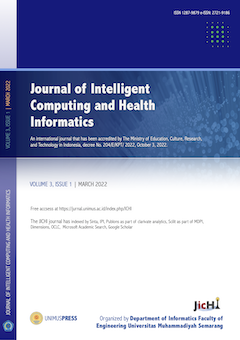EfficientNet for Medical Image Classification: Performance vs. Efficiency in Skin Cancer Detection
(1) Universitas Muhammadiyah Semarang
(2) Universitas Muhammadiyah Semarang
(3) Universitas Muhammadiyah Semarang
(4) Universitas Muhammadiyah Semarang
(5) First Technical University
(*) Corresponding Author
Abstract
Keywords
Full Text:
PDFReferences
Anwar, R. S. S. (2023). EfficientNet Algorithm for Classification of Different Types of Cancer. Artificial Intelligence and Applications. https://doi.org/10.47852/bonviewAIA32021004
Goceri, E., & Karakas, A. A. (2020). Comparative evaluations of CNN based networks for skin lesion classification. 14th International Conference on Computer Graphics, Visualization, Computer Vision and Image Processing (CGVCVIP), Zagreb, Croatia, 1–6.
Guergueb, T., & Akhloufi, M. A. (2022). Skin Cancer Detection using Ensemble Learning and Grouping of Deep Models. International Conference on Content-Based Multimedia Indexing, 121–125. https://doi.org/10.1145/3549555.3549584
He, K., Gan, C., Li, Z., Rekik, I., Yin, Z., Ji, W., Gao, Y., Wang, Q., Zhang, J., & Shen, D. (2023). Transformers in medical image analysis. Intelligent Medicine, 3(1), 59–78. https://doi.org/10.1016/j.imed.2022.07.002
Hellín, C. J., Olmedo, A. A., Valledor, A., Gómez, J., López-Benítez, M., & Tayebi, A. (2024). Unraveling the Impact of Class Imbalance on Deep-Learning Models for Medical Image Classification. Applied Sciences, 14(8), 3419. https://doi.org/10.3390/app14083419
Li, Z., Koban, K. C., Schenck, T. L., Giunta, R. E., Li, Q., & Sun, Y. (2022). Artificial Intelligence in Dermatology Image Analysis: Current Developments and Future Trends. Journal of Clinical Medicine, 11(22), 6826. https://doi.org/10.3390/jcm11226826
Parker, E. R. (2021). The influence of climate change on skin cancer incidence – A review of the evidence. International Journal of Women’s Dermatology, 7(1), 17–27. https://doi.org/10.1016/j.ijwd.2020.07.003
Ragupathi, T., Govindarajan, M., & Priyaradhikadevi, T. (2022). Class Imbalance Handling with Deep Learning Enabled IoT Healthcare Diagnosis Model. Intelligent Automation & Soft Computing, 34(2), 1351–1366. https://doi.org/10.32604/iasc.2022.025756
Ravi, V., Narasimhan, H., & Pham, T. D. (2021). EfficientNet-Based Convolutional Neural Networks for Tuberculosis Classification (pp. 227–244). https://doi.org/10.1007/978-3-030-69951-2_9
Roy, D., Roy, A., & Roy, U. (2024). Learning from Imbalanced Data in Healthcare: State-of-the-Art and Research Challenges (pp. 19–32). https://doi.org/10.1007/978-981-99-8853-2_2
Wang, J., Zhu, H., Wang, S.-H., & Zhang, Y.-D. (2021). A Review of Deep Learning on Medical Image Analysis. Mobile Networks and Applications, 26(1), 351–380. https://doi.org/10.1007/s11036-020-01672-7
Article Metrics
Abstract view : 571 timesPDF - 88 times
DOI: https://doi.org/10.26714/jichi.v5i2.14338
Refbacks
- There are currently no refbacks.
____________________________________________________________________________
Journal of Intelligent Computing and Health Informatics (JICHI)
ISSN 2715-6923 (print) | 2721-9186 (online)
Organized by
Department of Informatics
Faculty of Engineering
Universitas Muhammadiyah Semarang
W : https://jurnal.unimus.ac.id/index.php/ICHI
E : jichi.informatika@unimus.ac.id, ahmadilham@unimus.ac.id
This work is licensed under a Creative Commons Attribution-ShareAlike 4.0 International License.








